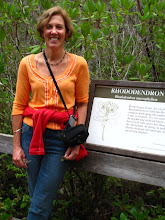"We're having goose?" Katherine said. "I can't even stand the thought of poultry. It's my pregnancy aversion."
"We'll have plenty of other things for you," I said.
"And you're supposed to be a vegetarian," she scolded.
"I am a vegetarian; I'll eat veggies."
"Will there at least be Lemon Lulu?"
Lemon Lulu is a local bakery-made lemon cake sprinkled with powdered sugar that is so sublime people sneak around with knives secreted about their persons cutting surreptitious slices after patting their tummies and proclaiming in loud voices, "Oh, no thank you, I couldn't possibly eat another bite."
"There will be Lulu."
This was a week before Christmas/Cheerful Children's Day, before I had braved waist-high snow drifts and howling winds, bareheaded, clutching the rapier sharp saw in my bare hand, to claim our mighty Frasier Fir from the forests of Vermont.
"Mom, you went to the tree farm, and someone probably cut it for you,"Will said.
"That's not true! I had to lie on my side in the snow and ice to hack through the trunk with a rusty blade, my fingers black with frost bite, shivering uncontrollably with ague - "
"Yeah, right. Ague?"
"Why won't you believe me?"
Once home, I had dumped our mighty Frasier into the red enamel tree stand, slit the netting, propped the trunk against my head for balance and, while on hands and knees had tightened all three screws with a wrench, which, as anyone knows who has done this without any help, takes enormous reserves of patience and self-congratulatory grunts.
Next, I had strung the lights and decorated the boughs with all our favorite handmade ornaments: the precious, lustre-less green glass ball with its faded, crinkled red ribbon, embossed with Will 1990; the section of green cardboard egg carton, sprinkled with silver glitter, the white clay snow goose with its beady black eye, the papier mache beer mug, the papier mache Santa with its good and bad sides; Katherine's tiny red wooden sled, purchased the year of her birth and placed in its accustomed central location. I filled in with all our other locally made and hand-crafted ornaments, adding the new one: a sweet, white wooly lamb.
"Nice bush, Mom," Katherine commented when she saw the tree.
"It's a TREE!" I said, "I had to drag it - "
"It's a pregnant bush," Katherine laughed. "Where's the top?"
"I cut the top, " I admitted. "I got a bit carried away with the clippers. But, we don't need a top, there's no star, it's not religious. It's just a tree to put presents under."
"It's nice," she allowed.
About this time Juan the Gardener commented that our family neurosis involved my children taking shots at me.
"Thanks," I said.
"All kids do it," he said. "Well, not all kids."
"We're a lot better," I said.
"I see the new ornament," Will announced when he came home. "It's this dumb lamb."
Somewhere between food shopping, wrapping presents, and making currant stuffing for the "game bird," a virulent illness, which symptoms included the inability to breathe, mental fog, and annihilating exhaustion stopped me in my tracks.
"I can't do this," I said.
And that's when they came through. Katherine made roast asparagus.
 |
| Katherine |
 |
| Quincy |
 |
| Ty |
 |
| Juan |
 |
| Will |
 |
| The Lulu |







